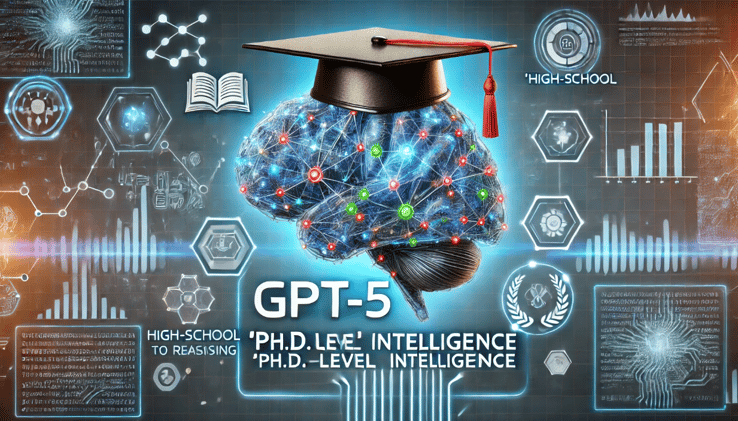The next evolution of ChatGPT, known as GPT-5, is set to revolutionize the field of artificial intelligence (AI) by achieving ‘Ph.D.-level’ intelligence. According to OpenAI Chief Technology Officer Mira Murati, this significant advancement will enable the AI to perform tasks with a level of sophistication previously unimaginable.
Significant Advancements
Murati compared the leap from GPT-4 to GPT-5 to advancing from high school to university-level intelligence. This analogy highlights the substantial progress OpenAI has made in developing more advanced AI systems. In an interview with Dartmouth Engineering, Murati discussed the capabilities of previous versions, such as GPT-3, which she likened to having ‘toddler-level’ intelligence. On the other hand, GPT-4 was described as a ‘smart high-schooler.’ The anticipation is that GPT-5 will reach ‘Ph.D.-level’ intelligence for specific tasks within the next couple of years.
From Toddler-Level to Ph.D.-Level Intelligence
The progression from GPT-3 to GPT-4 marked a significant improvement in AI capabilities. However, Murati emphasizes that GPT-5 represents an even more substantial leap forward. This is not just about increasing the complexity of tasks; it’s about achieving a new level of intelligence that can tackle complex problems with ease.
GPT-3: Toddler-Level Intelligence
While GPT-3 was an impressive achievement, its limitations are apparent when compared to human-level performance. The AI system struggled with nuanced and abstract concepts, often requiring additional context or clarification. This is not surprising, given the vast knowledge gap between a toddler’s understanding of the world and that of a Ph.D.-level expert.
GPT-4: Smart High-Schooler
GPT-4 was a significant improvement over GPT-3, demonstrating its ability to tackle more complex tasks with greater accuracy. However, its limitations became apparent when faced with highly specialized or abstract topics. The ‘smart high-schooler’ analogy highlights the AI’s ability to excel in areas such as language processing and knowledge retrieval but still falls short of human-level performance.
GPT-5: Ph.D.-Level Intelligence
The anticipation surrounding GPT-5 is palpable, with many expecting a transformative leap forward in AI capabilities. While it’s difficult to predict the exact extent of its advancements, Murati’s comparison to ‘Ph.D.-level’ intelligence suggests that GPT-5 will be capable of tackling complex tasks with ease.
Projected Timeline
Despite earlier rumors suggesting a 2023 release, Murati clarified that GPT-5 is expected to debut in late 2025 or early 2026. This extended timeline may disappoint those who were expecting a sooner release, but the advancements promised are significant.
A Delayed But Worthwhile Release
While it’s tempting to speculate about what could have been achieved with an earlier release, Murati emphasizes that OpenAI is committed to delivering a high-quality product. The additional time will allow for further refinement and testing, ensuring that GPT-5 meets the lofty expectations set by its predecessors.
Capabilities and Expectations
The enhanced intelligence of GPT-5 is expected to enable the AI to perform at a level capable of passing Ph.D. exams, particularly in tasks requiring advanced memory and reasoning. Microsoft CTO Kevin Scott has also highlighted these capabilities, noting the next-gen AI’s potential.
A New Era for AI
GPT-5 represents a new era for AI, one where machines can tackle complex problems with ease. The possibilities are endless, from tackling long-standing scientific challenges to improving decision-making in various industries.
Task-Specific Intelligence
Murati emphasized that the ‘Ph.D.-level’ intelligence of GPT-5 will apply to certain tasks, acknowledging that while current systems can match human-level performance in specific areas, they still fall short in many others.
The Limitations of Current AI Systems
While current AI systems excel in areas such as language processing and knowledge retrieval, they struggle with abstract and nuanced concepts. GPT-5 aims to bridge this gap, enabling the AI to tackle complex tasks with greater accuracy and efficiency.
Previous Rumors and Developments
Initial speculation about GPT-5’s release suggested it would arrive in late 2023, which was later adjusted to a potential summer 2024 launch. However, the summer release turned out to be GPT-4o, an impressive update but not the transformative leap anticipated with GPT-5.
The Anticipation Continues
As development continues, the AI community remains eager to see the advancements GPT-5 will bring. The anticipation is palpable, with many expecting a game-changing release that will revolutionize the field of AI.
In conclusion, GPT-5 represents a significant leap forward in AI capabilities, one that promises to deliver ‘Ph.D.-level’ intelligence for specific tasks within the next couple of years. While the projected timeline may be delayed, the advancements promised are substantial and warrant the wait. As OpenAI continues to push the boundaries of what is possible with AI, the world eagerly awaits the release of GPT-5.










